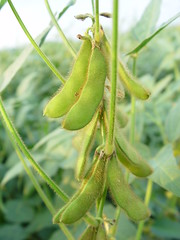
Soybean pods by jwinfred |
Confidential contracts detailing Monsanto Co.’s business practices reveal how the world’s biggest seed developer is squeezing competitors, controlling smaller seed companies and protecting its dominance over the multibillion-dollar market for genetically altered crops, an Associated Press investigation has found.
Why should you care?
Declining competition in the seed business could lead to price hikes that ripple out to every family’s dinner table. That’s because the corn flakes you had for breakfast, soda you drank at lunch and beef stew you ate for dinner likely were produced from crops grown with Monsanto’s patented genes.
Where does Monsanto get such power?
At the same time, Monsanto’s patent rights give it the authority to say how independent companies use its traits, Quarles said.“Please also keep in mind that, as the (intellectual property developer), it is our right to determine who will obtain rights to our technology and for what purpose,” he said.
Maybe letting companies patent life was a bad idea. Especially companies that were close to being monopolies anyway.
“(M)onopoly, I have endeavoured to show, though a very “grievous tax” …, and though it may increase the revenue of a particular order of men …, diminishes instead of increasing that of the great body of the people; and consequently diminishes instead of increasing the ability of the great body of the people to pay taxes. The men, too, whose revenue the monopoly increases, constitute a particular order, which it is both absolutely impossible to tax beyond the proportion of other orders, and extremely impolitic even to attempt to tax beyond that proportion.”Translation from the 18th century: monopolies are bad for everybody else. As the AP article quotes a farmer as saying:—Adam Smith, Wealth of Nations, 1776
“They can charge because they can do it, and get away with it. And us farmers just complain, and shake our heads and go along with it.”
But there is something that could be done:
A spokesman for Iowa Attorney General Tom Miller said the office is examining possible antitrust violations. Additionally, two sources familiar with an investigation in Texas said state Attorney General Greg Abbott’s office is considering the same issues. States have the authority to enforce federal antitrust law, and attorneys general are often involved in such cases.
The feds could get involved as well:
Any Justice Department case against Monsanto could break new ground in balancing a company’s right to control its patented products while protecting competitors’ right to free and open competition, said Kevin Arquit, former director of the Federal Trade Commission competition bureau and now a antitrust attorney with Simpson Thacher&Bartlett LLP in New York.It’s time to find out.“These are very interesting issues, and not just for the companies, but for the Justice Department,” Arquit said. “They’re in an area where there is uncertainty in the law and there are consumer welfare implications and government policy implications for whatever the result is.”
Short Link: